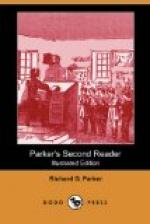13. By the unwearied endeavors of father, mother, brother and sisters, this pretty little baby, by the time that it was three years old, could speak plainly anything that was repeated to him, and had learned the names of almost everything that he saw about the house, the yard, and the street.
14. But it was observed that Guido, the dog, although he could not speak a word, had also learned the names of many things; and when George, the oldest son, told him to go and bring his ball to him, Guido would wag his tail, and go up into George’s chamber, and look about the room until he had found the ball; and then he would run down the stairs, and dropping the ball at his young master’s feet, look up in his face, expecting that George would throw it down for him to catch again.
[Illustration]
15. The baby, however, learnt words and names much faster than Guido; for although Guido knew as much as any dog knows, yet dogs are different creatures from children, and cannot learn so much nor so fast as children can, because it has not pleased God to give them the same powers.
16. Now, perhaps you may wish to know who this interesting family were of whom I have been speaking; and you will probably be surprised to learn, that all I have told you about this little baby is true of every little baby, and that the manner that every infant is taught to speak is the same.
17. It is the same manner as that in which the little Spanish girl, mentioned in the seventh lesson, was taught to speak the English language.
LESSON X.
Words.—ORIGINAL.
1. I told you, in the last lesson, how an infant child first learned to speak, when it was taught by its father and mother, and brother and sisters.
2. I intend to show you, in this lesson, how the little child learned the meaning of a great many words himself, without the assistance of any one else.
3. He was very fond of Guido, the dog, and watched everything he did, especially when his brother George was playing with him.
4. When George called Guido, and said to the dog, “Come here, Guido,” the little boy could not help noticing that Guido went to George.
5. When George’s father or mother called George, and said, “Come here, George,” the little child saw that George went to his father, or his mother.
6. Now, nobody told the little child what George, or his father, or his mother, meant by the word come; but he always saw, that when any one said to another, “Come,” that the one who was spoken to always moved towards the person who called him, and in this way the little child found out what his father or his mother meant by the word come.
7. It was in this way, my young friend who are reading this lesson, that you, yourself, learned the meaning of most of the words that you know.




